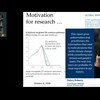endangering
Catriona McKinnon: Endangering Humanity: An International Crime?
Catriona McKinnon, Professor at Politics and International Relations, University of Reading ABSTRACTWith the Anthropocene underway, the vulnerability of future people to present people is greater than

The conversational context and conceptual engineering
Conceptual engineering concerns what it is for a concept to be defective and therefor ameliorated or abolished. The goal of this project, however, is to shift the focus to the role of the context, which might help us understand conflicts about the meaning of our words.
Alva's Futures Ideas in the Construction of Swedish Future Studies
This paper discusses the ideas in the works of the Alva Myrdal future studies group and Swedish future studies discourse. Historical knowledge of future discourses in the past may be an important way

Olle Häggström
I am a professor of mathematical statistics at Chalmers University of Technology and a board member of the Royal Swedish Academy of Sciences (KVA) and of the Royal Swedish Academy of Engineering Science
Julie Jebeile: Technological innovation facing climate change
Venue: Institute for Futures Studies, Holländargatan 13 in Stockholm, or online Research seminar with Julie Jebeile, SNF professor at the Institute of Philosophy of Universität Bern. She is a philosophe

Per Molander
I have a PhD in control engineering and hold a Bachelor's degree in mathematics, literature, etc. Throughout my career, I have worked on applying research in the political decision-making process with

Julia Steinberger: Is it possible to live well within planetary limits? Evidence and modelling from the LiLi project
Professor Julia Steinberger researches and teaches in the interdisciplinary areas of Ecological Economics and Industrial Ecology. Her research examines the connections between resource use (energy and

Lucia Karens
I have a bachelor's degree in Engineering Physics. I am currently finishing my Master's degree in Machine Learning. At the Institute for Futures Studies, I work as a research assistant for the project E, led by . The aim of the project is to investigate how stereotypes about minority and immigrant groups have evolved over time in Sweden and Finland, by analysing several decades' worth of newspaper articles. My main tasks are running the quantitative analysis of the data with various machine learning methods, as well as visualizing the results.

Emma Engström
I defended my PhD thesis on predictive modeling of groundwater contamination at the Department of Sustainable Development, Environmental Science and Engineering (SEED), KTH, Royal Institute of Technol
The Ethical Considerations of Pantropy in the Colonization of Mars
In: The Philosophy of Outer Space. Explorations, Controversies, Speculactions edited by Mirko Daniel Garasic and Marcello Di Paola. Routledge. Abstract The project of colonizing Mars poses significant cha








